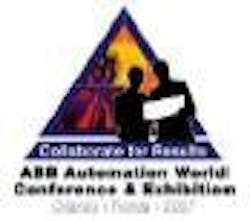Fred Kindle, ABB's President and CEO, held forth this afternoon at an Executive Forum. He talked about globalization, consolidation, and industry trends: emerging a winner.
He said he had four themes:
--increasing economic and political UNCERTAINTY
--new trends in techno-social ENVIRONMENT
--GLOBALIZATION
--growing importance of CAPITAL MARKETS
If this sounds like his speech this morning, it should. But this time, he conducted an interactive discussion with the audience. We talked about the difficulty of planning. One person in the audience remarked, "we're out-driving our headlights, and we can't see the curves ahead."
I asked him if the thought that part of the problem was the ubiquity of networking that Nick Donofrio from IBM had mentioned this morning in his keynote. "Absolutely I agree with you," Kindle said. It is like there is no longer a shock absorber, and there is no longer any way to tell the relative importance of news.
Kindle urged diversification, better risk management, staying on a sound financial basis, a different approach (he used the phrase no more planning!) to strategic planning using scenarios and preparing for the unknown. He noted the shortening of economic cycles from boom to bust, and drew our attention to the fact that it is impossible to plan for the increasing impact of isolated individual events like 9/11 or Alan Greenspan's recent remarks in Hong Kong that drove the market into a tailspin.
"What will happen," he asked, "if bird flu really does break out? Governments may restrict your movements. Imagine trying to do business without being able to fly or drive somewhere."
There are also no guarantees of access to natural resources. There is a real risk of resource protectionism to go along with the resurgence of economic and nationalistic protectionism that appears to be coming.
And how do you deal with stakeholders like politicians and NGOs far from headquarters?
With the emergence of the analyst industry and the "smart shareholder" and the private equity fund proliferation, Kindle said, as he said in his keynote earlier today, you must provide the right return or you will be gone. Somehow we need to manage this short term thinking with what must be done over the long term to ensure the wellbeing of the company.
About the Author
waltboyes
waltboyes
Sign up for our eNewsletters
Get the latest news and updates

Leaders relevant to this article:


